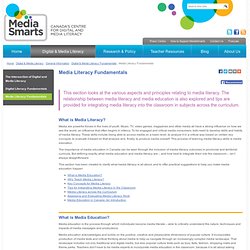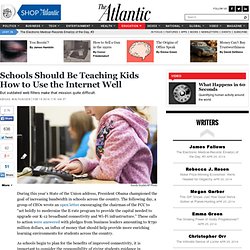

Movement Grows to Assess Students' Digital Literacy - Education Week. Movement Grows to Assess Students' Digital Literacy - Education Week. TALL blog » Digital literacy. I was reminded by the writings of King Solomon of an idea I had a few years ago but neglected to write down.

In Ecclesiastes he draws a picture of the never-ending cycles of life which could be seen as having a beautiful balance and harmony but perhaps more commonly as acting like a monotonous cage. The sun rises and the sun sets, and hurries back to where it rises. The wind blows to the south and turns to the north; round and round it goes, ever returning on its course. All streams flow into the sea, yet the sea is never full. To the place the streams come from, there they return again. CC – tidefan Certainly my recent experience online has felt like being trapped in a loop. I worked on digital projects for the BBC at the turn of the century. A surface view only sees the loop This is all surface though and the reality, as ever, is far more complex than my rant.
Media Literacy Fundamentals. What is Media Literacy?

Media are powerful forces in the lives of youth. Music, TV, video games, magazines and other media all have a strong influence on how we see the world, an influence that often begins in infancy. To be engaged and critical media consumers, kids need to develop skills and habits of media literacy. Schools Should Be Teaching Kids How to Use the Internet Well - Abigail Walthausen.
But outdated web filters make that mission quite difficult.

Randy Snyder/AP Photo During this year’s State of the Union address, President Obama championed the goal of increasing bandwidth in schools across the country. The following day, a group of CEOs wrote an open letter encouraging the chairman of the FCC to “act boldly to modernize the E-rate program to provide the capital needed to upgrade our K-12 broadband connectivity and Wi-Fi infrastructure.” These calls to action were answered with pledges from business leaders amounting to $750 million dollars, an influx of money that should help provide more enriching learning environments for students across the country.
Overview_of_researchv2_tcm4-285566. Establish Good Tech Habits Now to Last a Lifetime. Technology can be an absolute lifesaver for students in higher education.

It can help you communicate and collaborate, keep you organized, help to improve your writing, and even help expand your future employability. Unfortunately, too many students already have poor tech habits that can undermine their education and future success, such as engaging in portable procrastination and failing to live in the present. Digital Literacy Summit report. <div class="greet_block wpgb_cornered"><div class="greet_text"><div class="greet_image"><a href=" rel="nofollow"><img src=" alt="WP Greet Box icon"/></a></div>Hello there!

If you are new here, you might want to <a href=" rel="nofollow"><strong>subscribe to the RSS feed</strong></a> for updates on this topic. <div style="clear:both"></div></div></div> A Global Imperative: The Report of the 21st Century Literacy Summit, is the result of an April 2005 meeting held in San Jose, California. The meeting was convened by the George Lucas Educational Foundation and Adobe Systems, and the report published by The New Media Consortium (www.nmc.org) based in Austin, Texas. The 32 page report (available as a PDF file) is distributed under a Creative Commons Attribution-NonCommercial-NoDerivs license, which is great to see for a publication like this.
Here are a few highlights from the summit report that stood out when I read it: 128-hartley. Cursive – The Process Not the Product. Only the Sound Itself?: Early Radio, Education, and Archives of “No-Sound” Early cinema scholars are faced with statistics that suggest that possibly eighty percent of moving pictures produced in the first thirty years of their existence are lost—that is, they were thrown away because they were no longer profitable, or destroyed through fire or overuse.
Likewise, radio historians researching early radio programming formats are confronted with a daunting inability to listen to many of the programs we write about. What does it mean to write about sound without being able to listen to the sounds firsthand? Where can radio scholars like myself track down sound in other places besides recorded media?
Narrowing Digital Divide by Training Parents and Students on the Internet. While many across America correspond through social media such as Facebook, Twitter or directly online using Internet-powered platforms, 17-year-old Taequann Davidson is spreading the word about the strength of the Internet the old fashioned way — by word of mouth.

"I have my friends come over to work on school projects," (on my computer) he said. "I tell them to think about what they would do without the Internet — with Google for research, e-mail to send content to teachers and applying for colleges. These are the kinds of resources that are needed. " Comcast has the same approach. Challenging orthodox thinking about education technology. Digital Literacy and Multitasking. Digital Literacy Is In Crisis. It’s easy for those of us that live on the Web.

We know all the tricks. We spend hours, days, months, years, discussing and analyzing and thinking and applying. We not only know how to use the tools, we understand the implications. We get that there’s a revolution taking place. In part, we’re all creating it. It’s not like that for everyone. We’re the anomaly. On Friday I attended the Canadian Internet Forum, put on by the Canadian Internet Registration Authority (CIRA), keepers of .ca, and representatives of Canada on the world stage when it comes to Internet governance.
It was a fascinating day, full of insightful speakers and thoughtful, open dialogue. As a teacher, it’s digital literacy that is closest to my heart. One of the best talks of the day was given by Dr. She said one thing during her talk that really struck home with me. There’s a lot of emphasis these days on teaching computer skills at all levels, from K-12 through post-secondary. Sri Lanka government turns schools to ICT centres to close digital gap. Digital Inclusion By Kelly Ng | 10 December 2013 | Views: 1512 Telecommunications Regulatory Commission of Sri Lanka (TRCSL) and ITU have initiated a digital inclusion project to transform 33 schools into community ICT centres.

The ‘Connect a School, Connect a Community’ project will benefit over 8500 students from remote areas with low connectivity and digital literacy. Is the Israeli government taking its high-tech aspirations too far? - Business Israel News. DIGITAL_LITERACY_2013B. EJ869420. Digital-literacy. 26-27. 714EEFCD27374EB09677FED5C05557F1. Digital and Media Literacy: How Can It Support 21st Century Learning?
Apprenticing students in the art of learning. Featured Post Happy New Year!!

You may have noticed…I took a tech break for the holidays! There may not have been an abundance of posts and sharing happening, but I was still collecting away and have more resources than ever to share in 2012. Digital Literacy in Upper Secondary School - What Do Students Use Their Laptops for During Teacher Instruction? - Nr 02 - 2012 - Nordic Journal of Digital Literacy - tidsskrifter - idunn.no - Nordic journals online. Introduction In most societies, schools are responsible for the teaching and development of literacy skills.

Different studies of literacy have highlighted the importance of investigating how literacies differ across contexts, and there is extensive research on literacy in and outside of schools (Scribner and Cole 1981; Heath 1983; Barton and Hamilton 1998; Jones 2000; Pitt 2000; Gee 2007). These studies all emphasize a dichotomy between the literacies that are formalized, standardized, institutionalized and dominant, such as most school literacies, and the literacies that are personal, informal and vernacular (Freire and Macedo 1987; Street 1993; Street 2003; Gee 2004; Barton 2007). School literacy is commonly based on canonical texts, which has led to school literacy being criticized because it requires distinct literacy practices based on academic ways of thinking and the use of academic language (Gee 2004). The High Cost of Digital Illiteracy. Individuals who are not digitally literate are at a disadvantage when it comes to interacting with others and being employed in the 21st century.
But ignorance of the appropriate use of digital technologies can cause serious personal problems as well. In 2009, nursing student Amanda Tatro argued that her private Facebook postings about dissecting a cadaver in one of her classes were protected speech under the first amendment. "Digital and Media Literacy: A Plan of Action" by Renee Hobbs.